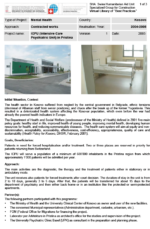
ICPU (Intensive Care Psychiatric Unit) in Pristina
Poffet François
Factsheet, English, 3 pages
Summary
The health sector in Kosovo suffered from neglect by the central government in Belgrade, ethnic tensions (dismissal of Albanian staff from senior positions), and chaos after the break up of the former Yugoslavia. This resulted in a deteriorated health system affecting the Kosovar population, which even before the war had already the poorest health indicators in Europe. The Department of Health and Social Welfare (predecessor of the Ministry of Health) defined in 2001 five main policy goals: healthy start in life, improved health of young people, improving mental health, developing human resources for health, and reducing communicable diseases. The health care system will aim at equity and nondiscrimination, acceptability, accessibility, effectiveness, cost-efficiency, appropriateness, quality of care and sustainability (Health Policy for Kosovo, DHSW, February 2001). Goals, Beneficiaries: Patients in need for forced hospitalisation and/or treatment. Two or three places are reserved in priority for patients returning from Switzerland. The ICPU will serve a population of a minimum of 600’000 inhabitants in the Pristina region from which approximately 1’000 patients will be admitted per year. Approach: The main activities are the diagnostic, the therapy and the treatment of patients either in stationary or in ambulatory mode. The unit receives also patients for forced treatments after court decision. The duration of stay in the unit is from 2 to 10 days, generally 3 to 5 days. After that, the patients will be transferred for about 15 days to the department of psychiatry and then either back home or in an institution like the protected or semi-protected apartments
Publication Year
2005
Topic
Construction
